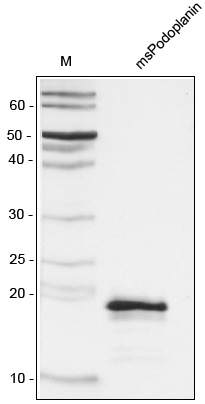Podoplanin Mouse Protein
Other products for "Pdpn"
Specifications
| Product Data | |
| Species | Mouse |
| Expression Host | E. coli |
| Expression cDNA Clone or AA Sequence |
GTIGVNEDDI VTPGTGDGMV PPGIEDKITT TGATGGLNES TGKAPLVPTQ RERGTKPPLE ELSTSATSDH DHREHESTTT VKVVTSHSVD KKTSHPNRDN AGDETQTTDK KDGLPVVTLE HHHHHH
N-terminal sequence: GTIGVNEDDI VTPGT |
| Predicted MW | 13.42 kDa |
| Purity | >98% |
| Presentation | Purified |
| Buffer | Presentation State: Purified State: Lyophilized purified protein. Buffer System: PBS without stabilizer |
| Endotoxin | < 0.1ng per µg of Mouse soluble Podoplanin |
| Reconstitution | We recommend a quick spin followed by reconstitution in water to a concentration of 0.1-1.0 mg/ml. This solution can then be diluted into other aqueous buffers and stored at 4°C for 1 week or -20°C for future use. |
| Preparation | Lyophilized purified protein. |
| Protein Description | Recombinant Mouse soluble Podoplanin |
| Storage | The lyophilized protein is stable for a few weeks at room temperature, but best stored at –20°C. Reconstituted soluble Podoplanin should be stored in working aliquots at –20°C. Avoid repeated freeze-thaw cycles. |
| Reference Data | |
| RefSeq | NP_001277751 |
| Locus ID | 14726 |
| UniProt ID | Q62011, A8Y5F6 |
| Cytogenetics | 4 E1 |
| Synonyms | Gp38; OTS-8; RANDAM-2; T1-alpha; T1a; T1alpha |
| Summary | Mediates effects on cell migration and adhesion through its different partners. During development plays a role in blood and lymphatic vessels separation by binding CLEC1B, triggering CLEC1B activation in platelets and leading to platelet activation and/or aggregation (PubMed:14522983, PubMed:15231832, PubMed:20110424, PubMed:17616532). Interaction with CD9, on the contrary, attenuates platelet aggregation and pulmonary metastasis induced by PDPN. Mediates effects on cell migration and adhesion through its different partners. Through MSN or EZR interaction promotes epithelial-mesenchymal transition (EMT) leading to ERZ phosphorylation and triggering RHOA activation leading to cell migration increase and invasiveness. Interaction with CD44 promotes directional cell migration in epithelial and tumor cells (By similarity). In lymph nodes (LNs), controls fibroblastic reticular cells (FRCs) adhesion to the extracellular matrix (ECM) and contraction of the actomyosin by maintaining ERM proteins (EZR; MSN and RDX) and MYL9 activation through association with unknown transmembrane proteins. Engagement of CLEC1B by PDPN promotes FRCs relaxation by blocking lateral membrane interactions leading to reduction of ERM proteins (EZR; MSN and RDX) and MYL9 activation (PubMed:25347465). Through binding with LGALS8 may participate to connection of the lymphatic endothelium to the surrounding extracellular matrix (By similarity). In keratinocytes, induces changes in cell morphology showing an elongated shape, numerous membrane protrusions, major reorganization of the actin cytoskeleton, increased motility and decreased cell adhesion (PubMed:10574709). Controls invadopodia stability and maturation leading to efficient degradation of the extracellular matrix (ECM) in tumor cells through modulation of RHOC activity in order to activate ROCK1/ROCK2 and LIMK1/LIMK2 and inactivation of CFL1 (By similarity). Required for normal lung cell proliferation and alveolus formation at birth (PubMed:12654292). Does not function as a water channel or as a regulator of aquaporin-type water channels (By similarity). Does not have any effect on folic acid or amino acid transport (PubMed:12032185).[UniProtKB/Swiss-Prot Function] |
Documents
| FAQs |
| SDS |
Resources
Recombinant Protein Resources |
{0} Product Review(s)
0 Product Review(s)
Submit review
Be the first one to submit a review
Product Citations
*Delivery time may vary from web posted schedule. Occasional delays may occur due to unforeseen
complexities in the preparation of your product. International customers may expect an additional 1-2 weeks
in shipping.






























































































































































































































































 Germany
Germany
 Japan
Japan
 United Kingdom
United Kingdom
 China
China
